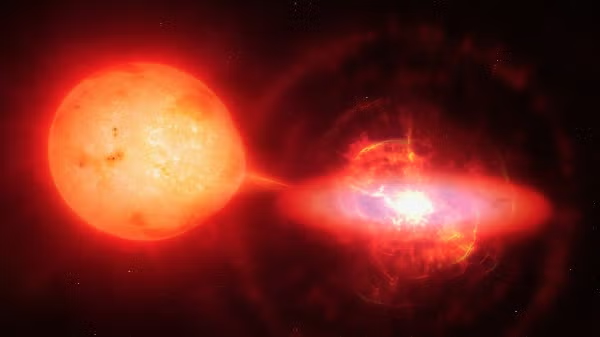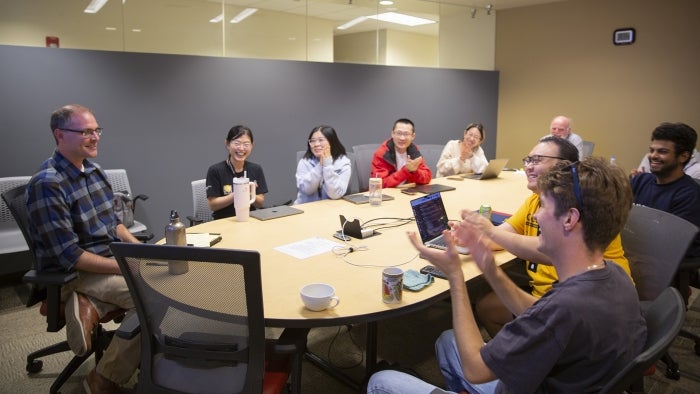ASU computing school director honored with prestigious award

Ross Maciejewski, director of the School of Computing and Augmented Intelligence, part of the Ira A. Fulton Schools of Engineering at ASU, has been inducted into the prestigious Visualization Academy by the Institute of Electrical and Electronics Engineers. The accolade recognizes highly significant work in data analytics and computer graphics. Photo by TJ Triolo/ASU
Today, in an increasingly complex world, lawmakers and leaders must make big decisions, and they must often do so very quickly.
Because of this, data visualization is an increasingly important specialty of computer engineering. The science of taking in huge amounts of information and displaying it in maps, charts and graphics might be the key to helping the world rapidly understand complex issues and enabling people to act on what they learn.
Ross Maciejewski, professor of computer science and engineering and director of the School of Computing and Augmented Intelligence, part of the Ira A. Fulton Schools of Engineering at Arizona State University, is a leading authority in data visualization. He has been tapped for his expertise in creating visual analytics for homeland security, public health, social media and law enforcement. This week, he was inducted into the Visualization Academy through the Institute of Electrical and Electronics Engineers.
Each year, the Visualization and Graphics Technical Community, or VGTC, selects a handful of specialists to receive the top honor, which is designed to recognize highly significant work.
David S. Ebert, a professor of computer science and ECE Gallogly Chair at the University of Oklahoma who also serves as a visualization awards program chair for VGTC, notes the special importance of the induction.
“The Visualization Academy highlights the accomplishments of the leaders in the field,” Ebert says. “Dr. Maciejewski was chosen for his long-term and continued contributions to visualization, visual analytics and social media analytics research.”
Rewarding research and results
Maciejewski developed an interest in data visualization as a doctoral student at Purdue University, where he collaborated with the U.S. Coast Guard on an early-career project. In the aftermath of Hurricane Sandy, lawmakers wanted to know if they could send rescue boats and crews from the Great Lakes to assist in recovery operations without causing any new safety issues.
The resulting tools and graphics were used to brief Congress on staffing needs, the effects of station closures and ways to improve emergency response times. Maciejewski’s team received a meritorious commendation for its efforts. But he says the real lesson was that data analytics could be a powerful tool.
“I observed that this type of research could have real-world impact,” he says. “Good data visualization can prevent huge amounts of information from becoming overwhelming and help all kinds of people make better-informed decisions.”
Inspired by the experience, Maciejewski founded the Center for Accelerating Operational Efficiency in 2017. The center is a consortium of 25 universities and partners, led by ASU and funded by the U.S. Department of Homeland Security, where Maciejewski oversees a dynamic portfolio of data-driven projects that span public health, social media, transportation and supply chain management.
A pattern of success
The new VGTC recognition caps a string of successes for Maciejewski. In 2014, he received the Faculty Early Career Development Program (CAREER) Award from the National Science Foundation for his data visualization work. He was subsequently named a Fulton Exemplar Faculty member and an ASU Global Security Fellow.
Maciejewski is consistently in the top 3% of ASU faculty members for grant awards by dollar amount. During his tenure, he has been recognized with $16.8 million in personal awards, has been a collaborator on more than $300 million in research proposals and has directly contributed nearly $14 million in research expenditures.
“Ross Maciejewski exemplifies the rare combination of teaching excellence, innovative research and outstanding leadership,” says Kyle Squires, ASU senior vice provost of engineering and dean of the Fulton Schools. “This induction recognizes both the significant impacts of data visualization in computer science and Ross’ remarkable contributions to advancing the field.”
Lev Gonick, chief information officer for ASU Enterprise Technology, adds, “At ASU, we recognize that leadership in the technology sector is not just a competitive advantage — it’s essential to fulfilling our mission of inclusion and innovation.
“We are proud to support and celebrate leaders like Ross who demonstrate the excellence and vision that align with our core values of advancing knowledge, fostering student success and impacting communities globally.”
More Science and technology

Stuck at the airport and we love it #not
Airports don’t bring out the best in people.Ten years ago, Ashwin Rajadesingan was traveling and had that thought. Today, he is an assistant professor at the University of Texas at Austin, but back…

ASU in position to accelerate collaboration between space, semiconductor industries
More than 200 academic, business and government leaders in the space industry converged in Tempe March 19–20 for the third annual Arizona Space Summit, a statewide effort designed to elevate…

A spectacular celestial event: Nova explosion in Northern Crown constellation expected within 18 months
Within the next year to 18 months, stargazers around the world will witness a dazzling celestial event as a “new” star appears in the constellation Corona Borealis, also known as the Northern Crown.…


